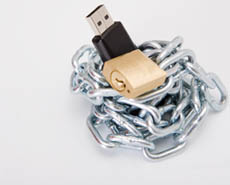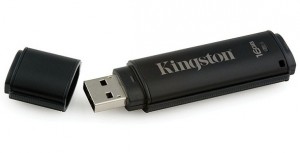
Network security gets the lion’s share of the press, but an often overlooked part of data security architecture revolves around the use of USB drives. As the capacity of these devices continues to soar, more and more data is going mobile. But that convenience is a double-edged sword that also carries with it the danger of loss or theft, and the resulting potential for a disaster.
 Kingston, a brand already well-known for its multitude of award-winning flash storage solutions, recently introduced its latest ultra-secure USB drive, the Data Traveler 6000 (DT6000). This device offers an incredible array of safeguards:
Kingston, a brand already well-known for its multitude of award-winning flash storage solutions, recently introduced its latest ultra-secure USB drive, the Data Traveler 6000 (DT6000). This device offers an incredible array of safeguards:
- FIPS 140-2 Level 3 validated
- No passwords stored on device or host
- Utilizes elliptic curve cryptography (ECC)
- Drive locks down, encryption key self-destructs after 10 intrusion attempts
- Secure channel communication
- Enforced complex password
- Tamper-proof physical security barrier
If you don’t know what some of that means, take my word for it – this device provides amazingly robust protection for data. The DT6000 is also built to survive rough handling – the casing is titanium-coated stainless steel and the drive is waterproof up to a depth of four feet.
But is there a need for such rigorous flash drive security standards in the business world at large? Kingston gears its sales pitch toward government organizations and financial institutions that routinely move sensitive data and customer files. As sales director Nidhi Sethi noted at a recent DT6000 launch event:
“Establishing security policies and deploying USB products that prevent data loss is as important and immediate as an organization’s network security. Using non-secure USB drives makes organizations vulnerable to data loss and breaches that can affect the company’s credibility with its employees, customers, and partners. The DT6000 is the most secure USB flash drive available and will meet the most stringent corporate or government requirements.”
 However, a recent Ponemon Institute study spotlights the business community-wide dangers posed by mishandled flash drives. Nearly half of the organizations surveyed were victimized by the loss of privileged information contained on USB drives in just the last two years; the average number of customer records compromised per organization was 12,000. Simple negligence was far more of a problem than malicious intent, which proves a very important lesson: the potential for disaster is only an accident away.
However, a recent Ponemon Institute study spotlights the business community-wide dangers posed by mishandled flash drives. Nearly half of the organizations surveyed were victimized by the loss of privileged information contained on USB drives in just the last two years; the average number of customer records compromised per organization was 12,000. Simple negligence was far more of a problem than malicious intent, which proves a very important lesson: the potential for disaster is only an accident away.
So while hundreds of companies jockey for supremacy in the marketplace for network and cloud-based security solutions, Kingston is one of the few to sharpen its focus solely on the hardware side. The abundant need for these products is proven by the Ponemon study, anecdotal evidence from across the business world, and high-profile stories of loss (or potential loss), including the recent Secret Service scandal in Columbia in which the President’s travel schedule was exposed to compromise.
Take a moment to consider what kind of information you are carting around on a USB drive, and what its loss could potentially mean… maybe an upgrade to a $100-200 ultra-secure flash drive is worth it?


